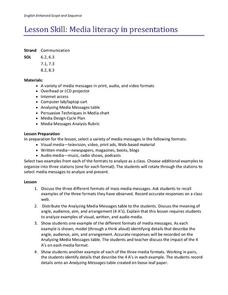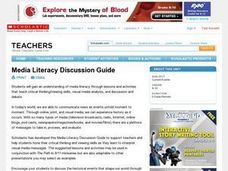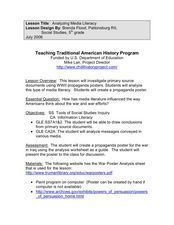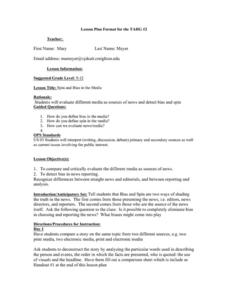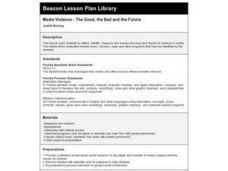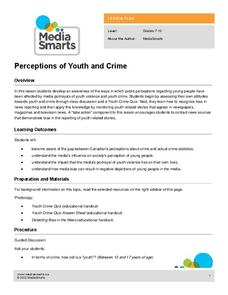Prestwick House
Understanding Language: Slant, Spin, and Bias in the News
We live in a time of fake news, alternative realities, and media bias. What could be more timely than an activity that asks class members to research how different sources report the same topic in the news?
Newseum
Are You a Publisher?: Free Press and You
What kinds of media do your pupils use to read and publish information? After a discussion about what publishing means, and about the freedom of the press, class members interview one or two other people about their publishing habits....
Newseum
E.S.C.A.P.E. Junk News
Fair, balanced, and reputable information? There's an acronym for that! Scholars learn the E.S.C.A.P.E. method for evaluating news sources. Then, pupils work in small groups to read and analyze a news story and discuss the activity to...
Curated OER
Media Literacy in Presentations
Middle schoolers study the three types of mass media messages: visual media, written media, and audio media. After a class discussion which has them list examples of each, learners get into pairs and work on analyzing the "Four A's" in...
News Literacy Project
News Goggles: Lionel Ramos, Oklahoma Watch
Given all the recent criticism of the news media and coverage, it's crucial that young people are given the tools they need to evaluate what they see, hear, and read about current events. A video interview from "News Goggles" introduces...
News Literacy Project
News Goggles: Covering a Newsworthy Trial
The trial of Derek Chauvin, former Minneapolis police officer charged in the death of George Floyd, is the focus of a lesson that asks pupils to compare how local, nationial, and international news organizations reported the testimony of...
Nemours KidsHealth
Media Literacy and Health: Grades 9-12
An essential skill for 21st-century learners is to know how to find reliable sources of information. Two activities help high schoolers learn how to determine the reliability of health-related news from websites, TV, magazines, or...
Facing History and Ourselves
Free Press Makes Democracy Work
A unit study of the importance of a free press in a democracy begins with class members listening to a podcast featuring two journalists, one from a United States public radio station and one from Capetown, South Africa. The lesson,...
PBS
Technology: Conveniences and Consequences
It's a delicate balance—using technology to improve our lives while still protecting the environment, and ourselves, from the hazards of technology use. Class members examine statistics about the increase in media use, complete a survey...
Newseum
Use ‘War of the Worlds’ to Teach Media Literacy
Orson Welles' 1938 radio broadcast of "War of the Worlds" is the focus of a lesson that looks at the importance of clarity in broadcasting. After listening to the radio broadcast, class members discuss the ethical obligations to...
Curated OER
Media Literacy Discussion Guide
High schoolers examine and analyze visual media and its messages critically. They determine whether specific media messages inform, entertain, or persuade and what factors influence the media. Using primary sources, they participate in...
Curated OER
Analyzing Media Literacy
Fifth graders define propaganda, evaluate World War II propaganda posters to analyze media literacy, complete War Poster Analysis worksheet, and create and share their own propaganda posters containing subject matter pertaining to war in...
Curated OER
Spin and Bias in the Media
High schoolers compare different types of media. In this media comparison lesson, students will assess the where all types of media gets its information by viewing a video of a news story and critiquing it.
Curated OER
Media Violence - The Good, the Bad and the Future
Third graders define, identify, measure, and assess the level and impact of violence in media. The media forms evaluated include music, sitcoms, news, and other programs that are identified and shared by the class.
Curated OER
Radio News
Part of a larger unit from the Media Awareness Network on media literacy, this particular lesson plan focuses on the medium of news radio. Small groups participate in discussions on their radio listening habits as well as the...
Curated OER
Columbine Tapes: The Media's Right To Know
Learners research the Columbine tragedy. They read about the media role of watchdog on the government. Students discuss and debate how the media has been involved in the latest release of Columbine videos and other material.
Media Smarts
Unit Two: Celebrities and World Issues
Develop media smarts by considering the power of celebrity involvement in world issues. A look at the work of such celebrities as Angelina Jolie, Oprah, and Bono prepare learners to develop their own media campaign for a global...
Media Smarts
Taking Charge of TV Violence
Encourage your class to become aware of the violence that is present in children's television programs and how this violence can influence children. Do this by holding the planned class discussion in this lesson plan and providing...
Media Smarts
Truth or Money
Two compelling texts about tobacco companies' influence over editorial content in print media introduce readers to the concept of advertising censorship. After study and discussion, class members compose a mock "final column" by a...
Media Smarts
Challenging Hate Online
Looking at the different ways organizations disseminate their messages using digital media leads to developing a digital anti-hate media campaign. Although some of the resources reflect the Canadian developer, the links provide...
Media Smarts
Learning Gender Stereotypes
How do media representations influence our attitudes? Examining advertisements through the filter of gender representation forms the basis of this, the second of three lessons that address gender stereotypes. Resources include links,...
Media Smarts
Perceptions of Youth and Crime
Explore the potential for bias in the news and in scholars' own attitudes and opinions. Begin with a quiz on youth crime to see how learners perceive crime among their peers. After looking at the correct answers, put individuals in...
Curated OER
Children's Media and Censorship
High schoolers form opinions about children and television censorship after analyzing literature. They complete a journal writing activity to identify the topic and make a list of inappropriate television shows for children. Next, they...
Media Smarts
The Broadcast Project
As part of a unit on media studies, kids are asked to chart their viewing habits, observe the advertising that sponsors their favorite shows, and then to imagine what they would broadcast if given a block of airtime.





